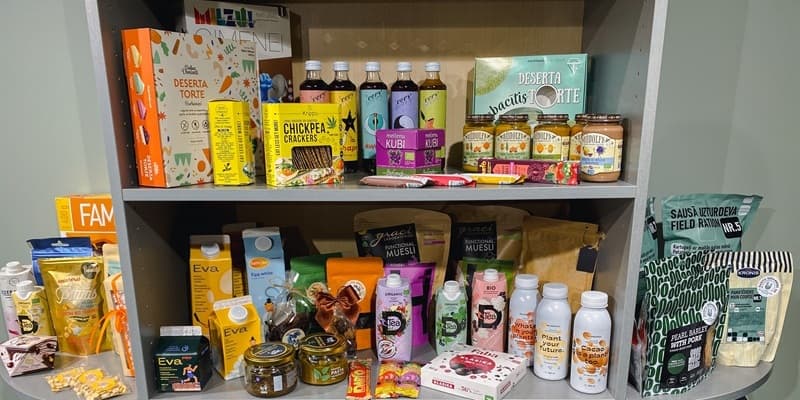Lab innovations: how business and universities can collaborate and use state support

Attēls: LBTU
The Latvia University of Life Sciences and Technologies (LBTU) has for many years been a reliable partner for entrepreneurs who want to develop new products, improve technologies and strengthen their competitiveness. The motto of the Technology and Knowledge Transfer Office (TEPEK) "Cooperation. Innovation. Development." clearly outlines the directions of its activity – to promote cooperation between scientists and entrepreneurs and to facilitate the commercialisation of research results.
LBTU offers a wide range of research and scientific competences, from food technology, veterinary medicine and agriculture to construction, environmental sciences, forestry and IT solutions. It has created technological solutions for monitoring bee colonies, developed recipes for Milzu! cereal flakes, dry rations for the National Armed Forces, transport flow monitoring systems and a data warehouse system for precision animal husbandry and beekeeping. The list keeps growing.
Cooperation with the University always starts with a conversation, says Sandra Muižniece-Brasava, Head of the Technology and Knowledge Transfer Office: “At the first meeting, we listen to the needs and ideas of entrepreneurs and assess whether we have the right technological base and competences. It is both an introduction and an opportunity for the entrepreneur to understand what the University has to offer and, perhaps, to compare it with opportunities at other universities in Latvia and around the world.” These meetings can take place remotely or in person in Jelgava, where entrepreneurs can also learn about the available technologies and laboratory facilities, which are extensive, covering both pilot plants and quality testing of products and technologies.
On a practical level, cooperation can range from consultations about technological processes to the full development of a new product. Sometimes entrepreneurs approach the university with an idea already in the pipeline, sometimes with a problem that requires a solution, and sometimes they are looking for young specialists – students to join them in developing innovations for production.

If both parties agree to start working together, costs are estimated, and a contract is signed that clearly defines the service or output the company will receive. If the project is innovative and has market potential, the cooperation may also be implemented by using innovation vouchers provided by the Investment and Development Agency of Latvia (LIAA) or other state support tools.
“We are happy to advise companies on the available support instruments – we work with them daily and have a good understanding of the current opportunities. LIAA vouchers allow you to offset the costs of research and development, helping new businesses and products to emerge. All that is needed from a budding entrepreneur is the determination to realise what he or she has planned,” Ms Muižniece-Brasava adds.
LBTU also provides consultancy outside traditional research areas. For example, entrepreneurs can find out what production equipment and what technological parameters will be needed to produce their products, thus saving both money and time. “Sometimes very modern, expensive equipment is available with many parameters, of which the entrepreneur needs only a part. We help you to understand what is needed to avoid unnecessary investments, while at the same time finding solutions for further growth and development,” Ms Muižniece-Brasava explains.
Some of the most successful examples of food products created with the involvement of LBTU scientists and technologists include vegetable puree for children “Rūdolfs”, muesli cereal “Graci Musli”, healthy snack “Pupuchi”, fermented plant-based kefir “Fermentful”, as well as the innovative “Good Mood Meals” products – freeze-dried meals that can be stored for years. Freeze-drying or lyophilization is a process that ensures the product is lightweight and can be used years later, simply by adding water. “The development process for Good Mood Meals was particularly thorough, looking at the compatibility of the different ingredients, the effects of the freeze-drying process and the taste and texture of the food after reconstitution. It was important not only to ensure a long shelf-life, but also to maintain high quality, taste and nutritional composition.
These products have significant export potential as they combine dual uses, both for food reserves, tourism and expeditions in extreme conditions, and for military applications where light weight, nutritional value and rapid preparation are important. “This is a great example of how focused research, considered technology selection and close collaboration with the entrepreneur can create a truly competitive and internationally sought-after product,” Ms Muižniece-Brasava notes.
“The University is very proud that entrepreneurs come back to us looking to start producing their products and we can contribute. For example, a new product is created, export is launched and an idea for the next one is born. They come back – and that means that the cooperation and the result have been significant. This trust is the highest recognition of the University’s work: its ability not only to support but also to inspire entrepreneurs to new challenges and innovations. I am also glad that young people who have chosen to study with us in Jelgava are creating their own companies and developing products in Latvia with export potential,” Ms Muižniece-Brasava adds.